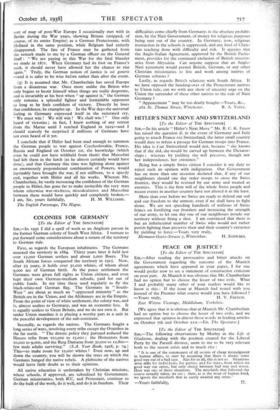COLONIES FOR GERMANY • [To the Editor of THE SPECTATOR]
SIR,—In 1931 I did a spell of work as an Anglican parson in the former German colony of South West Africa. I venture to put forward some considerations about a return of the territory to German rule.
First, as regards the European inhabitants: The Germans annexed the territory in 1884. Thirty years later it held just over 12,000 German settlers and about a,000 Boers. The South African forces conquered the territory in 1915. Now, after 23 years, it holds over 31,000 whites, of whom about 9,000 are of German birth. At the peace settlement the Germans were given full rights as Union citizens, and even kept their own German-medium schools, paid for out of public funds. In my time these used regularly to fly the black-white-red German flag. The Germans in " South- West " are about as much an " oppressed minority " as the British are in the Union, and the Afrikaners are in the Empire. From the point of view of white settlement, the colony was, and is, almost useless to Germany, and was an economic loss. It is equally useless to Great Britain, and we do not own it. But under Union mandate it is playing a worthy part as a unit in the peaceful development of the sub-continent.
Secondly, as regards the natives. The Germans fought a long series of wars, involving every tribe except the Ovambos in the far north. " The drastic policy they pursued seduced the Herero tribe from -to,000 to 15,000 ; the Hottentots from 20,000 to 9,000, and the Berg Damaras from 30,000 to 12,800— few male adults surviving." (S.A. Year Book, 1928, P. 74.) This—to make room for 12,000 whites ! Even now, up and down the country, you will be shown the trees on which the Germans hanged the native rebels. A plebiscite of the natives Would leave little doubt as to their opinions.
All native education is undertaken by Christian missions, whose schools, if approved, are subsidised by Government. German miisionaries, both RC. and Protestant, continue to do the bulk of the work, do it well, and do it in freedom Their
difficulties come chiefly from Germany, in the absolute prohibi- tion, by the Nazi Government, of money for religious purposes . being sent out of the country. In Germany, now, religious instruction in the schools is suppressed, and any kind of Chris- tian teaching done with difficulty and risk. It appears that the Anglo-Italian Agreement, approved by the British Parlia- ment, provides for the continued exclusion of British mission- aries from Abyssinia. Can anyone suppose that an Anglo- Nazi agreement would permit British, German, or any other Christian missionaries to live and work among natives of German colonies ?
Lastly, as regards British relations with South Africa. If we have opposed the handing-over of the Protectorate natives to Union rule, can we with any show of sincerity urge on the Union the surrender of these other natives to the rule of Nazi Germany ?
" Appeasement " may be too dearly bought.—Yours, &c.,
28A St. Thomas Street, Winchester. R. A. YATES.
























































 Previous page
Previous page